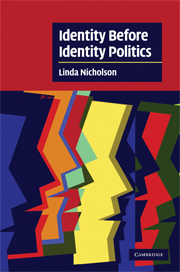Book contents
- Frontmatter
- Contents
- Acknowledgements
- Introduction
- 1 The politics of identity: race and sex before the twentieth century
- Introduction to chapters 2 and 3
- 2 Freud and the rise of the psychological self
- 3 The culture concept and social identity
- Introduction to chapters 4 and 5
- 4 Before Black Power: constructing an African American identity
- 5 Womem's identity/women's politics
- Epilogue: identity politics forty years later: assessing their value
- Index
- Cambridge Cultural Social Studies
3 - The culture concept and social identity
Published online by Cambridge University Press: 17 July 2009
- Frontmatter
- Contents
- Acknowledgements
- Introduction
- 1 The politics of identity: race and sex before the twentieth century
- Introduction to chapters 2 and 3
- 2 Freud and the rise of the psychological self
- 3 The culture concept and social identity
- Introduction to chapters 4 and 5
- 4 Before Black Power: constructing an African American identity
- 5 Womem's identity/women's politics
- Epilogue: identity politics forty years later: assessing their value
- Index
- Cambridge Cultural Social Studies
Summary
“Culture,” in its anthropological sense, provided a functionally equivalent substitute for the older idea of “race temperament.” It explained all the same phenomena, but it did so in strictly non biological terms …
(George W. Stocking, Jr.)In the previous chapter I described one type of challenge to the late nineteenth-century use of nature to sort social groups, that made by dynamic psychology. This new turn in psychology, and its growing appeal outside of the academy, contributed to an increased sense within popular thought that individual character is the unique outcome of a variety of environmental interactions rather than a “bundled” set of attributes emanating from inherited, natural givens. Thus, the emphasis in dynamic psychology on the environmental causes of character expressed a new appreciation that, for all, character is more individual than group based.
In this chapter I want to look at another means by which the employment of identity labels to differentially rank human beings began to unravel in the early and mid part of the twentieth century. I want to look at changes in the use of a particular concept, “culture,” as playing a particularly important role in this unraveling. In this case, the move did not suggest a greater individuality of identity, but rather a greater equivalence in the value of the practices of different social groups. “Culture” described many of the practices previously associated with racial identity as less naturally acquired.
- Type
- Chapter
- Information
- Identity Before Identity Politics , pp. 65 - 91Publisher: Cambridge University PressPrint publication year: 2008

